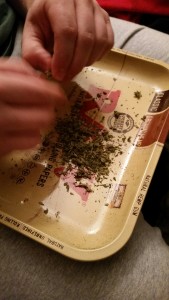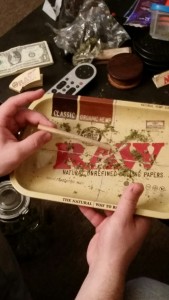A tangible barrier of pungent, yellow smoke separates the two of us.
Through the dissipating wall of smoke, I see him slump down into the sofa with the content look of someone who has become recently stoned. On him, it looks almost like an expression of freedom.
“You a tits or ass kind of guy?” A toothy grin breaks across his face.

Eric begins the rolling process. Photo by Caleb Peek.
“Depends on the situation”, I reply with a chuckle. At least this dealer has a sense of humor. I haven’t met very many, but some of these guys act sedated, almost pulseless. This one is animated. He halfheartedly tells me his name- to ensure the anonymity I promised him, I’ll call him Eric. He’s a native of Charlotte, NC, and at 20, he’s nearly halfway to his bachelor’s degree at Western Carolina University. But after a year as a pot broker, he’s developed quite the reputation. Three calls have been answered in the 20 minutes I’ve been here, all from customers trying to get their fix. Incredibly bright, even compared to non-users, he carries himself as a businessman.
“So why weed?” I want to see just how open he’s willing to be with me under the condition of anonymity. “Couldn’t you make more money selling something a little… harder?”
He glances out the window for a moment, examining the mountains that encapsulate the Cullowhee Valley. “What you have to understand is, I love weed. Like I really love it. Have ever since I took that first hit. And it’s so easy to get! Well, it was anyway. My plug got robbed the other day and lost all his cash, so we’ll see what happens.”
This is the unfortunate reality for thousands like Eric. Livelihoods can be built in a week, and destroyed in a day.
“It’s tough coming up,” he informs me. “You’ve got to learn to count on no one but yourself, because that’s how you stay out of trouble.”
The rules of the drug game are simple. There is a mutual code of ethics between buyer and dealer. It’s a self-policing system, wherein respect is the law. Without respect, there can be no profit. And in this line of work, legality is irrelevant when profit is on the line.
∞
A 2013 study from the National Institute of Health on Drug Abuse, entitled Monitoring the Future, shows that 36 percent of college students surveyed had tried or experimented with marijuana in the last year. Although only half as many students use marijuana as non-college students, the number of students who smoke weed every single day is at its highest in three decades.

Eric shows how, in his opinion, a finished blunt should look. Photo by Caleb Peek.
Sgt. Jacob Deal is now a Support Services Officer at Western Carolina University. He’s an alum of the school, and in his mid-30s, significantly younger than the majority of his colleagues.
Now in his fifth year of employment with the department, he’s been promoted from his entry level job of campus patrol. But his eyes light up as he talks about working the beat in semesters past.
I ask him what drugs are most common at the school, my school, although I anticipated what he was about to say.
“Well, marijuana is what we get a very large majority of the time”, he explains. “Occasionally we’ll come across some cocaine, or an opiate like heroin or morphine. I’ve seen LSD a few times, and even PCP once. But in terms of sheer volume, it’s marijuana by far.”
Surprise, surprise.
“Do you feel that there’s a ‘problem’ with weed on campus? Or does the department have it under control?” I half-expect to get maced for questioning the ability of the force.
“Anywhere something illegal is being sold, it’s a problem. However, marijuana is only a Schedule VI offense in North Carolina. So we’re sensible about it.”
Federal law classifies weed as a Schedule II narcotic, which the Drug Enforcement Administration (DEA)defines as “a drug with a high potential for abuse, with use potentially leading to severe psychological or physical dependence.” Included in this category are cocaine, hydrocodone, oxycodone, fentanyl, and Adderall.
However, a Schedule VI narcotic in the State of North Carolina is hardly even a narcotic. 1.5 ounces of marijuana could bring a felony charge, but any amount less is a misdemeanor. And the officer in charge of the situation has discretion on whether charges should even be filed. According to the WCU Fire and Safety Report 2015, 71 drug-related referrals were written by University Police in 2014, compared to 23 actual arrests that were made.
“Generally when we find marijuana, it’s either by accident or we were looking for something else.”
∞
Eric agrees with the officer.
“Yeah man, I don’t think they even take it that seriously anymore. When they do find it, it’s probably ‘cause someone complained about the smell or something. People just need to get over it and accept it.”
And people are accepting it. Four states allow recreational weed use. Three states have decriminalized the possession of marijuana. House Bill 78 is making its way through the North Carolina legislature right now, which would protect medical marijuana recipients from prosecution. 70 percent of North Carolinians approve of an update of the highly restrictive measures regarding weed that the Tarheel State currently has in place.
But for now, it’s still business as usual for dealers.
“I’m sure it’ll be legal one day. But right now, I’m making $1,200 a week. So I’m not in too much of a hurry.”


